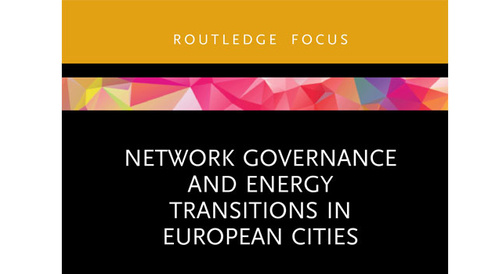
A book drawing on comparative case study analysis to demonstrate how local factors shape the prospect of network governance to support low-carbon energy transitions has been authored by CSIC Research Associate Dr Timea Nochta. The online launch event will take place on Wednesday 13 January, from 5pm to 6pm, and will feature talks and Q&As.
This book provides valuable insights into the structures and processes in urban governance, and the response of local authorities to the climate emergency. Based on in-depth case studies, it is essential reading to appreciate the role that cities can play in the transition to decarbonised societies.
Dr Jonathan Radcliffe, Reader in Energy Systems and Policy, School of Chemical Engineering, University of Birmingham, UK
Dr Nochta is a lead researcher for the CSIC and Ove Arup Foundation Digital Cities for Change (DC2) programme that seeks to deepen understanding of how built environment data can help improve city planning, management and the delivery of public services.
“Today it is increasingly clear that keeping global warming below the critical two degrees requires achieving net-zero carbon in just a few decades. As such, there is an urgent need to better understand how collaboration and joined-up working can support urban low-carbon transitions in different cities in order to develop contextually appropriate, place-based responses to climate change,” said Dr Nochta.
‘Network Governance and Energy Transitions in European Cities’, published by Routledge as part of the Focus on Energy Studies series, analyses three city cases from across Europe: Birmingham, Frankfurt and Budapest. It maps out existing governance networks – based on the actors involved and their interaction patterns – and the role and embeddedness of networks in the urban governance of low-carbon energy. The findings highlight the need to better understand the complex interplay between the opportunities and limitations of governance networks to support urban low-carbon transitions, and the local contextual enabling and constraining factors that influence their functioning and potential to perform this role.
The book makes the case that understanding such links between context and networks is crucial when designing and implementing new governance models aimed at facilitating and governing low-carbon urban development. “This book provides valuable insights into the structures and processes in urban governance, and the response of local authorities to the climate emergency. Based on in-depth case studies, it is essential reading to appreciate the role that cities can play in the transition to decarbonised societies,” said Dr Jonathan Radcliffe, Reader in Energy Systems and Policy, School of Chemical Engineering, University of Birmingham, UK.
Low-Carbon Energy Transitions in European Cities will be of particuar interest to scholars of energy policy, urban governance and sustainability transitions.
• More details and registration for the online book launch on 13 January here.
• Order ‘Network-Governance-and-Energy-Transitions-in-European-Cities’
Also available as eBook
